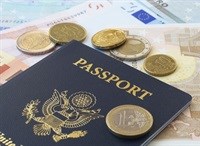There are many unforeseen challenges you may be exposed to while travelling abroad - like losing important documents, illness, an accident, becoming the victim of crime, or even a natural disaster.
Charlotte Quenet-Meintjes, head of Workaway International South Africa, shares her instrumental safety tips, as well as tips on how handle an emergency, when travelling abroad.
Travel insurance - "This is one of the best things you can do as it will cover all the basics while you're in another country," advises Quenet-Meintjes. This includes cover for potential cancellation or delay of your flight, travel medical cover, as well as lost luggage.
Be attentive - Empower yourself by being vigilant when exploring new places - it is important to remain aware of what is going on around you. Be prepared, keep alert, and make sure that you know where the nearest police station is.
Share your whereabouts - Make sure that someone close to you is aware of your movements and expected arrivals and departures.
Valuables and cash - Ensure that your valuables are stored away safely at all times, and avoid packing these in your checked luggage where they may go missing.
Carrying large amounts of cash could lead to misplacement or even theft, and can also make it easier to overspend.
Emergency travel pack - "There are no fixed items that need to be included in this pack, but the most important ones are definitely medical items and personal documentation," she advises.
A few other items that should be included in this pack are:
Multiple copies of your passport, visa, electronic air ticket and home country's driver's license or ID;
an emergency/first aid kit and a copy of your insurance information; and
printed copies of area maps of your destination and/or other places you may visit.A medical emergency - In the event of a sudden injury or assault, you should try to get help from the nearest location or call an emergency services number immediately. "This is when your insurance will be greatly beneficial. Calling your travel insurer, country's embassy or consulate to inquire which hospital the embassy suggests using is recommended," she says.
Dealing with crime - "Travelling overseas doesn't mean you and your belongings are safer than they are at home, so extra care should be taken," advises Quenet-Meintjes. " Always report a crime to the local police department, even if you don't think they will take action, as the police report is needed for any insurance claims. If you experience theft of important travel documents like your visa or passport, take a copy of the police report to the nearest South African Embassy, where you will then be able to apply for a temporary passport/emergency travel document."
Strange parcels - "Possibly the most important situation to avoid while travelling is accepting strange parcels or packages with contents you are not familiar with," stresses Quenet-Meintjes. "These packages could contain harmful and illegal items that could land you in serious trouble, and you should decline the offer even if a cash reward is offered."











































